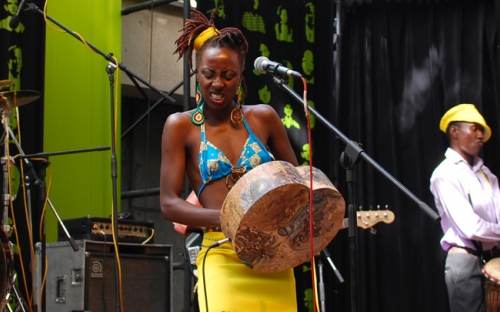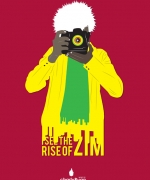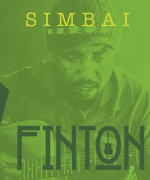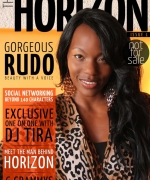Hope Masike - The Musician!
Thank you for joining us in the second part of the interview with Hope Masike of Kakuwe fame. The following is an interview with Hope in which she opens up and gives us her views about her music and Zimbabwean society.
POVO: Give us a bit of background about yourself, your music genre and how it all started.
Hope: We began as a group of four permanent band members. Theresa plays recorder, Elijah on bass and Dunmore plays the Jembe. I started with Dunmore, and a guy called Bernard, but back then I wasn't playing Mbira as seriously as I started doing later on. Ben played the guitar, Dunmore played the drums and I sang or played the rain stick. The music was more of hardcore jazz. When Ben left, Dunmore and I then met up with the current band members when I had enrolled for an Ethnomusicology course at the College of music. These two were Elijah and Theresa. Initially I wanted to learn the bass (Giggles). I was playing the Nyunga nyunga by then so we started creating different stuff using the Nyunga nyunga, bass guitar, Jembe and the recorder. Later on when we were playing at the Book Cafe we incorporated Western drums for their solid loud sound, to attract the crowd’s attention. Yeah, so that’s the band now, and we also incorporated Tsongwe and Marimba just to strengthen our rhythm.
POVO: What is the structure of the band in terms of rehearsals and song writing?
Hope: I write most of the songs, some are just folk songs, like Kuenda Mbire. One popular traditional song, Hondo, was just sampled to make our own version. Rehearsals are not structured, as it depends on peoples' availability like when there is something going on in the arts field in the country, at times we don't have much time to rehearse, like during HIFA, we just watch other bands perform, but whenever we have time we hook up for rehearsals.
POVO: Where does your inspiration come from?
Hope: I am tempted to give the very obvious answer that everyone says... Life! I am inspired by life, the things i see every day (Both laugh). But then that’s the truth! It’s just life, God, human beings – human beings are just amazing things!
POVO: How many songs are in your new album?
Hope: I don’t know what to tell you (Giggles). The promotional CD that I gave to radio and press had 15 songs which sources say was quite a disaster. The final CD is going to have a minimum of 8 songs and a maximum of 11. My debut album will feature all the tracks that listeners think are hot. We ended up with 15 songs in the album because every band member had their own choice which they wanted included.
POVO: How was the response where you have performed so far?
Hope: Our major spots for the past two or so years have mainly been the Rainbow Towers and the Book Cafe. The rest have been corporate functions, National Gallery art openings and in Sophia Town and a couple of other places. Audiences love good music, but when you're distressed, a country like Zimbabwe, at times people just want to have fun, at times they don't have time to listen to what you are saying, to listen to the quality of the chords you are playing. Most of the places are hot because the venue needs to make money so they are selling a lot of alcohol, so it ends up that kind of audience. It’s been a tough challenge but it also teaches you how to take control, if you can control drunkards you can control anyone, you can own any audience. Some of the places have been, really good, like the National Art Gallery, because people there appreciate art and take time to listen to you, and what you have to offer.
POVO: Any other challenges so far?
Hope: The usual –financial haven't been too major and I believe if you can make it in an environment like this then you are hot. You don’t have to wait for the economy to stabilize to do your stuff because once that happens, a lot of players are going to come into the industry and it becomes even tougher. So it’s easier now in a sense. Other challenges have been just maintaining a band! You know I have watched a lot of bands come up and then die! You got drunkards in the band; you have to find some way of getting your way with them so that you come to an understanding– to separate between business and pleasure. In addition, explaining to band members the money we have made and what is due to them, even though it is just a privilege not a right for them to know that. The knowledge that some guys are eventually going to down and get married, or continue with their formal education also threatens the sound you started with, because a new band member brings their own feel to the band.
POVO: Are you a part of any association for musicians?
Hope: There is the Zimbabwe Musicians Association, but I am not a member of that yet, but intend to join in future. However, my reservations come from the fact that I haven’t really seen them do anything worthwhile as an association for musicians.
POVO: You don't see any immediate benefits?
Hope: No, they hold seminars, you go and you discuss stuff, but nothing changes. Then there's the Zimbabwe Music Rights Association, which I am a part of.
POVO: Are they sticking up for your rights as musicians?
Hope: Yes they try. we get all the information we need in terms of our rights, commercial numbers and barcodes etc. Maybe I haven't given the other associations the benefit of doubt; they might not be that bad.
POVO: Relationship with other musicians?
Hope: On the surface, we look like we get along well together, but there is a lot of gossip (Both laugh). I guess it’s just the industry, because gossip also sells. There are some seasoned musicians who are very willing to assist except, we often feel intimidated approaching them. But, overall it’s not a bad industry at all maybe because there are a few players in it.
POVO: What genre is your music?
Hope: From my studies at the College of Music they say genre has to do with lyrics, what the music is saying. So I can say my music is a Gospel genre with Jazz influences. I have tackled issues to do with spiritual matters, my relationship with God, but then in translation it’s really to do with the listener. For me, it’s me and God. Someone else can feel a relationship with their ancestors, Allah etc. but it’s more a spiritual relationship with your God, whoever your God is. Then some of the songs are just instrumentals which the listener decides on their meaning to them. The style is more traditional jazz, but more traditional than jazz. The major influence coming from my being the band leader who plays the Mbira.




